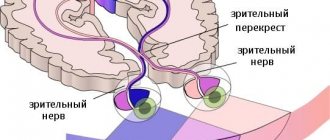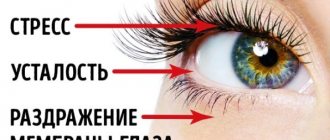Neurosis - what is it?
Neurosis is a collective term that refers to certain types of neurotic disorders. It can develop in both women and men. At risk are people who are in a certain phase of physiological changes: aging of the body or puberty. However, neurosis can occur at absolutely any age. In children, it usually goes away on its own, without treatment, and does not lead to any mental disorders. In adulthood, neurosis can greatly affect health - both physical and psychological. Often, neurotic disorders in adults cause pathologies of internal organs.
Negative stressful situations and acute psychological trauma can cause various painful manifestations in a person. The catalyst for neurosis can be an unresolved internal conflict or strong pressure from external factors that are uncomfortable for the patient. At the same time, not only severe injuries can provoke a neurotic disorder. Sometimes it becomes a consequence of mental fatigue or constant worry.
Neurotic disorders can manifest themselves in a variety of ways. Their most common signs are general malaise, obsessive thoughts, and fears. Neurosis often contributes to a decrease in mental activity and physical endurance. A person cannot fully perform his work, the quality of his work deteriorates. The patient becomes irritable, aggressive, and conflictual.
If this disorder is not treated promptly, severe mental illness may occur.
Causes of neurosis
There are several theories, each of which suggests considering certain factors that provoke neurotic disorders. So, from the physiological point of view, neurosis is a pathology of the body, the cause of which is a malfunction in the nervous system. Excessive mental activity, accompanied by a large number of nervous processes, can contribute to the destabilization of the psychological state.
There is another theory, according to which the cause of neurosis is a combination of an irritant and personality characteristics. For example, there is a stressful situation. People may perceive it differently. Some may treat it indifferently or with great patience, others are not always able to adequately respond to various stimuli.
General health is also important. People who do not take care of their health, smoke, eat poorly, abuse alcohol, do not have a clear regime and daily routine, often get sick, are constantly overworked physically and mentally, and are more susceptible to neuroses. In the event of a stressful situation, they are especially vulnerable. At the same time, not only negative factors can provoke a disorder. Even positive emotions can lead to the development of neurosis. The sharp and constant alternation of positive and negative factors has an even worse effect on the psyche. Thus, in childhood, a neurotic disorder can be the result of a “carrot and stick” type of upbringing.
There is also a psychoanalytic theory. Neurosis, according to its postulates, is the result of an internal conflict that arose due to the dissatisfaction of a basic need.
Moreover, the foundations of conflict can be laid at any age. Subsequently, they manifest themselves in the form of an unstable psychological state.
In general, the causes of neurosis in certain cases are the following factors:
- isolation of a person from society;
- conflict between instinctual drives and moral standards;
- strong pressure and control from others;
- a person's strong need for protection or recognition;
- a thirst for power, glory that cannot be satisfied;
- striving for ideality, perfectionism;
- inability to rest, uncontrolled workaholism;
- lack of life experience and skills to adequately perceive stressful situations.
These are psychological reasons. Physiological diseases include diseases of infectious or inflammatory etiology, addictions, including alcoholism and smoking. These factors reduce immunity, and therefore the body’s resistance to the external environment. How does a neurotic disorder manifest itself? Is it possible for vision to deteriorate with neurosis?
Introduction
Psychotropic drugs may have unwanted effects on the eyes.
Of all organs, they are most susceptible to the toxic effects of drugs, second only to the liver [1]. Many factors make the organ of vision sensitive to this group of drugs. Firstly, the visual apparatus consists of tissues of different origins [2]. Secondly, the eye has a relatively small mass and is characterized by a rich blood supply. Thirdly, tissues such as the retina and optic nerve are characterized by a very high metabolic rate [3]. The problem of identifying the undesirable effects of psychotropic drugs on the eye is that a significant proportion of patients taking these drugs for a long time often do not report what complications they experience in the visual organ. Moreover, studies in this direction are relatively few or poorly structured, and a cause-and-effect relationship is rarely found. In addition, psychiatrists, as a rule, when prescribing drugs do not pay attention to their possible side effects on the visual apparatus [4].
In this regard, it is relevant to increase the awareness of psychiatrists and ophthalmologists about the side effects of psychotropic drugs in relation to the organ of vision. The purpose of this work is to review the literature on ophthalmological complications arising from the use in psychiatric practice of typical and atypical antipsychotics, benzodiazepines, lithium salts, tricyclic antidepressants (TCAs), selective serotonin reuptake inhibitors (SSRIs), as well as a number of antiepileptic drugs used for treatment of affective disorders.
Symptoms of neurosis
There are two large groups of signs of neurosis: psychological and physical. The first include:
- emotional instability, frequent and causeless mood swings;
- lack of initiative, indecision;
- inadequate self-esteem: overestimation or underestimation of one’s own abilities;
- obsessive thoughts, uncontrollable fears;
- irritability, aggressiveness;
- constant feeling of anxiety, restlessness;
- a cynical attitude towards others, a desire to criticize everyone and for any reason;
- inconsistency of desires and needs;
- tearfulness, vulnerability, excessive impressionability, touchiness, suspiciousness.
A person in a state of neurosis concentrates heavily on traumatic events. In other words, this or that situation does not let the patient go; he constantly thinks about it, considers himself guilty, even if there is no reason for this. It’s almost impossible to focus on work or positive life moments. In this state, it is impossible to perform the amount of work that is normal for a healthy person. Labor productivity is falling. Because of this, a conflict situation at work may arise. This will worsen your mental state.
The most common symptom of neurosis is insomnia. It becomes increasingly difficult for a person to fall asleep at the usual time. If he does fall asleep, he has nightmares and wakes up in a cold sweat. In the morning you feel very tired, and drowsiness persists throughout the day.
Sometimes neurosis is accompanied by increased sensitivity to sounds. Loud voices and music irritate the patient. Photophobia and meteosensitivity develop. These factors are associated with the physical manifestations of neurosis. Among them:
- headache that hardly goes away, dizziness;
- discomfort in the heart area;
- digestive problems;
- increased blood pressure;
- weakness and trembling of hands;
- decreased appetite;
- excessive sweating;
- frequent need to urinate;
- changes in the menstrual cycle;
- decreased sex drive;
- the appearance of “floaters” before the eyes, blurring of vision, and a decrease in its acuity.
These symptoms are quite common and characteristic of many diseases. It’s difficult to call them specific. Consequently, when they appear, the doctor does not always look for reasons in the psychological state of the patient. Because of this, neuroses are always very long lasting.
Eye fatigue syndrome
Eye fatigue syndrome is a very unpleasant phenomenon, especially common among those who spend their entire working day at a desk or computer. Even children today are familiar with this feeling firsthand, as they literally cannot be torn away from modern gadgets and devices.
Most modern professions involve long hours of monotonous work, with a daily significant amount of information, the assimilation of which requires constant eye strain and even eye strain. This problem has not escaped schoolchildren, who spend almost all their days sitting in front of books or a monitor. And this is only during the learning process, let alone computer games, as well as other entertainment outside of school. However, even adults, having returned from work, happily settle down, some in front of the TV screen, some in front of the computer monitor. It is no wonder that in recent years, an increasing number of people need vision correction. This is caused by the intense rhythm of modern work life, stress, overload, attachment to electronic “assistants”, reading in transport or lying at home.
This lifestyle leads to a condition called eye fatigue syndrome, which is accompanied by the following symptoms:
- Redness (hyperemia) and irritation of the whites of the eyes;
- Pain in the eyes;
- Inability to concentrate with your gaze on a specific object;
- Pain, dryness and feeling of “sand or a foreign object in the eyes”;
- Headache, increased intraocular and blood pressure.
Eye fatigue syndrome, called asthenopia in ophthalmology, occurs as a result of intense visual activity, which continues for a long time, in low or, conversely, very bright lighting, in improperly designed (distracting) interiors, in an uncomfortable working position, as well as the tiring effect of the screen computer or TV. It is accompanied by a decrease in the performance of the oculomotor muscles when it is necessary to shift the gaze from one object to another and manifests itself:
- Cloudiness and vagueness of small details, numbers or letters;
- Cutting and pain in the eyes and temporal region;
- Photophobia and lacrimation.
Chronic eye fatigue will inevitably lead to the progression of myopia, farsightedness or the occurrence of an accommodation spasm, which will cause a weakening of visual acuity. And if chronic eye fatigue is aggravated by the presence of a bad habit of smoking, then sooner or later macular degeneration or even damage to the optic nerve will occur, which leads to complete blindness.
How can you protect yourself from such terrible consequences of eye fatigue syndrome and help your child? This issue is especially acute today, requiring a careful approach to the problem in order to avoid loss of visual functions.
Actually, despite the severity of its complications, visual fatigue syndrome itself does not require special treatment. It is enough just to give timely, proper rest to the tired organ of vision and make its difficult “life” as easy as possible for it. To do this, it is necessary to properly organize the workplace and space, regularly ventilate the room, provide optimal lighting, adjust the brightness and contrast of the computer monitor and TV, take frequent breaks when working for a long time at close range and look into the distance (preferably outside the window), go to bed on time and get at least 8 hours of sleep at night. It is also necessary to perform eye exercises, including palming, at least twice a day, and from time to time “pamper” your eyes with a massage and compresses with decoctions of medicinal herbs. It is ideal to include foods that are good for healthy vision in your diet and spend more time in the fresh air.
In the medical department, everyone can undergo examination using the most modern diagnostic equipment, and based on the results, receive advice from a highly qualified specialist. We are open seven days a week and work daily from 9 a.m. to 9 p.m. Our specialists will help identify the cause of vision loss and provide competent treatment for identified pathologies.
Various types of rings and segments are implanted into the MGC for keratoconus. You can find out the cost of various implants and their installation, and make an appointment at the Moscow Eye Clinic by calling the multi-line phone number 8 (800) 777-38-81 (daily from 9:00 to 21:00, free for mobile phones and regions of the Russian Federation) or using the online registration form.
Deterioration of vision due to neurosis
Neurosis and vision: can they be connected? As mentioned earlier, neurotic disorder occurs for various reasons, including as a result of infectious diseases. Moreover, the consequences of these disorders are also varied. Deterioration of vision due to neurosis is a fairly common picture observed by doctors.
Psychogenic manifestations of an unstable mental state include: narrowing of visual fields and a decrease in its acuity. Patients come to the ophthalmologist with complaints that they see poorly or see almost nothing. In this case, the patient is well oriented in space, does not bump into objects, and can even drive a car. Upon examination, it turns out that there are no visible reasons for the decrease in visual functions. This is due to the fact that the main factor leading to vision deterioration is a person’s reluctance to “see the problem.”
Narrowing of the visual fields is characteristic of hysterical neurosis. Usually it is also accompanied by increased photosensitivity and various signs of asthenopia - rapid eye fatigue.
The behavior of patients also changes. It can be partly called strange. On the one hand, a person complains of decreased visual function, and sometimes partial or complete blindness. On the other hand, such a condition does not cause him great anxiety, as it does in people who suddenly become blind. In other words, vision loss is not so painful if there are no pathological reasons behind it. They are not detected during examination. When the ophthalmologist has ruled out all hypothetical ailments that could explain the deterioration of vision, we are talking about psychological factors.
When a person is very frightened, he develops anxiety, a desire to hide, he instinctively closes his eyes so as not to physically see the problem. This is how a person protects himself with the help of various functions of his body. Psychological protection will manifest itself in the appearance of a veil before the eyes, narrowing of the visual fields and other ophthalmological symptoms.
How to avoid vision deterioration
In order to maintain good vision, you need to try not to succumb to stress and relax more often. To relieve overstrain, especially if your professional activity involves working on a computer, special eye exercises are well suited, which are best performed on a regular basis.
Eye exercises:
- Close your eyes and then open your eyes wide. Repeat the exercise 5-6 times.
- Look up, down, to the sides without moving your head. Repeat 3 times and then do the same with your eyes closed.
- Rotate your eyes clockwise and in the opposite direction. Repeat 3 times, then perform the exercise with your eyes closed.
- Blink rapidly for a minute.
- Stand near the window, look for some point or scratch on the glass. Look at it for 15 seconds, then for the same time, turn your gaze to some distant object outside the window. Borrow back to the point on the glass. Repeat 3-5 times.
- Rub your palms until they become hot. Then close your eyes for a few minutes, relax and imagine something pleasant, for example, the seashore or a forest landscape.
Proper nutrition is of great importance for eye health. The diet must include foods rich in vitamins A, C, D and E. Experts especially recommend eating fresh blueberries, which contain a substance that restores visual pigment. You can take special vitamin and mineral complexes for eye health, drink herbal teas that strengthen vision and have a calming effect on the nervous system.
The ARTOX Clinic offers diagnosis and treatment of any eye problems at affordable and affordable prices. Our experienced specialists will help you regain and maintain good vision.
View prices
Making an appointment with an ophthalmologist









